童年游戏的英文表达
过去小朋友玩的游戏英语作文
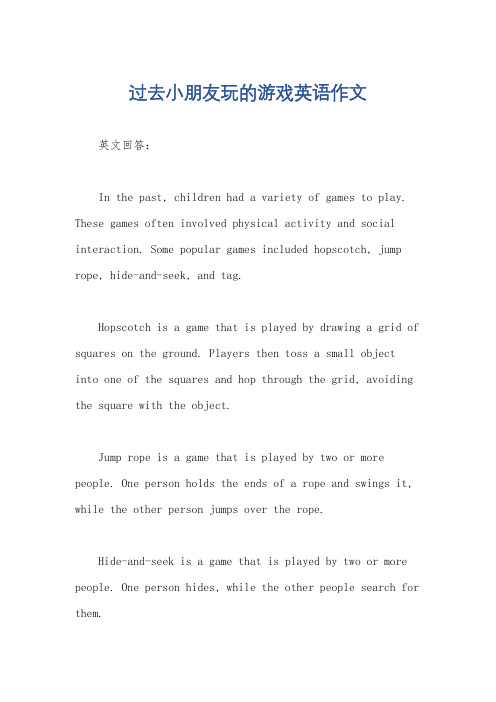
过去小朋友玩的游戏英语作文英文回答:In the past, children had a variety of games to play. These games often involved physical activity and social interaction. Some popular games included hopscotch, jump rope, hide-and-seek, and tag.Hopscotch is a game that is played by drawing a grid of squares on the ground. Players then toss a small objectinto one of the squares and hop through the grid, avoiding the square with the object.Jump rope is a game that is played by two or more people. One person holds the ends of a rope and swings it, while the other person jumps over the rope.Hide-and-seek is a game that is played by two or more people. One person hides, while the other people search for them.Tag is a game that is played by two or more people. One person chases the other people, and if they catch someone, that person becomes the new chaser.These are just a few of the many games that children used to play. These games were a great way for children to get exercise, socialize, and have fun.中文回答:过去,孩子们玩的游戏多种多样。
妈妈童年打四角游戏的作文

妈妈童年打四角游戏的作文英文回答:When I was a child, my mom used to play a game called "Four Square" with her friends. It was a popular game among kids during her childhood. Four Square is a game played on a square court divided into four equal quadrants. Each player stands in one of the quadrants and the goal is tohit the ball into another player's quadrant without letting it bounce twice. The player who fails to hit the ball or lets it bounce twice is out and the remaining players move up to the next quadrant. The last player standing in the highest quadrant becomes the winner.My mom used to love playing Four Square with herfriends after school. They would draw a square on the ground using chalk and divide it into four equal parts. They would take turns hitting the ball and trying to eliminate each other. It was a competitive and fun gamethat required agility and quick reflexes.中文回答:小时候,妈妈经常和朋友们一起玩一个叫做“四角”的游戏。
游戏英语怎么写
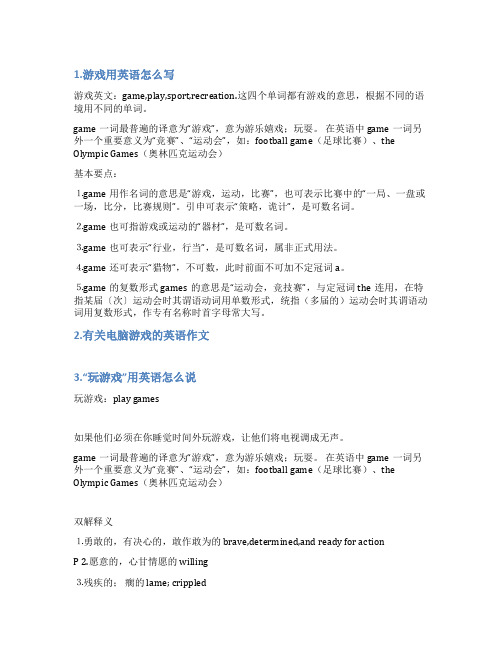
1.游戏用英语怎么写游戏英文:game,play,sport,recreation.这四个单词都有游戏的意思,根据不同的语境用不同的单词。
game一词最普遍的译意为“游戏”,意为游乐嬉戏;玩耍。
在英语中game一词另外一个重要意义为“竞赛”、“运动会”,如:football game(足球比赛)、the Olympic Games(奥林匹克运动会)基本要点:⒈game用作名词的意思是“游戏,运动,比赛”,也可表示比赛中的“一局、一盘或一场,比分,比赛规则”。
引申可表示“策略,诡计”,是可数名词。
⒉game也可指游戏或运动的“器材”,是可数名词。
⒊game也可表示“行业,行当”,是可数名词,属非正式用法。
⒋game还可表示“猎物”,不可数,此时前面不可加不定冠词a。
⒌game的复数形式games的意思是“运动会,竞技赛”,与定冠词the连用,在特指某届〔次〕运动会时其谓语动词用单数形式,统指(多届的)运动会时其谓语动词用复数形式,作专有名称时首字母常大写。
2.有关电脑游戏的英语作文3.“玩游戏”用英语怎么说玩游戏:play games如果他们必须在你睡觉时间外玩游戏,让他们将电视调成无声。
game一词最普遍的译意为“游戏”,意为游乐嬉戏;玩耍。
在英语中game一词另外一个重要意义为“竞赛”、“运动会”,如:football game(足球比赛)、the Olympic Games(奥林匹克运动会)双解释义⒈勇敢的,有决心的,敢作敢为的 brave,determined,and ready for actionP 2.愿意的,心甘情愿的 willing⒊残疾的;瘸的 lame; crippled基本要点⒈game作“勇敢的,有决心的,敢作敢为的”解时在句中可用作定语或表语。
⒉game也可作“愿意的,心甘情愿的”解,在句中多用作表语,与介词for连用。
⒊在口语中, game还可作“残疾的;瘸的”解,属古旧用法。
儿时游戏的中英表达
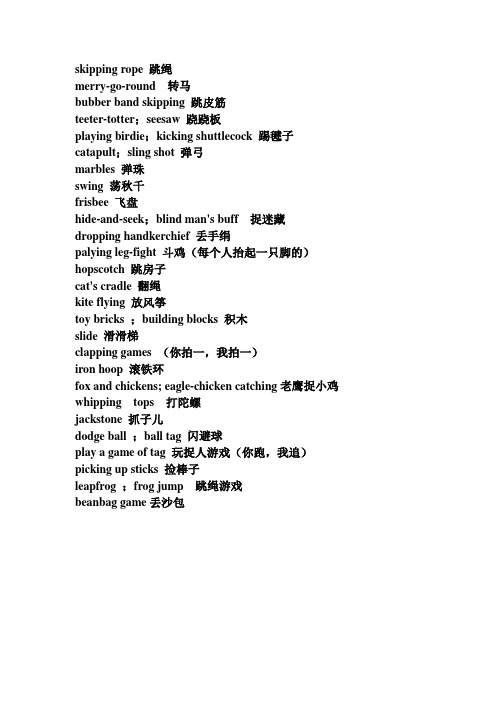
skipping rope 跳绳merry-go-round 转马bubber band skipping 跳皮筋teeter-totter;seesaw 跷跷板playing birdie;kicking shuttlecock 踢毽子catapult;sling shot 弹弓marbles 弹珠swing 荡秋千frisbee 飞盘hide-and-seek;blind man's buff 捉迷藏dropping handkerchief 丢手绢palying leg-fight 斗鸡(每个人抬起一只脚的)hopscotch 跳房子cat's cradle 翻绳kite flying 放风筝toy bricks ;building blocks 积木slide 滑滑梯clapping games (你拍一,我拍一)iron hoop 滚铁环fox and chickens; eagle-chicken catching老鹰捉小鸡whipping tops 打陀螺jackstone 抓子儿dodge ball ;ball tag 闪避球play a game of tag 玩捉人游戏(你跑,我追)picking up sticks 捡棒子leapfrog ;frog jump 跳绳游戏beanbag game丢沙包Hide-and-seek or hide-and-go-seek (or, in Scotland, hidey) is a variant of the game tag, in which a number of players conceal themselves in the environment, to be found by one or more "seekers". Numerous variants of the game can be found worldwide.[edit] GameplayThe game starts with all players in a central location, indoors or out. One player is given the designation of "it". There are two portions to the game: the hiding, where all the players except "it" locate a place in which to hide, and the seeking, where "it" attempts to locate as many of the players as possible. The overall objective is to remain undiscovered by "it".The hiding portion of the game begins with "it" using a method to avoid seeing the other players hiding, and counting out loud for a predetermined number of seconds, often with the aid of a word that takes about one second to say (e.g., "one-Mississippi, two-Mississippi..."). During the count, other players locate a place to hide. When the counting is completed, the "it" player usuallyannounces the start of the seeking portion by shouting a phrase such as "Ready or not, here I come!". "It" then begins a search for the hiding players.When all players have been found or caught, the next game's "it" is usually the first player to be found. Alternatively, the players can agree that the last person to be discovered or tagged will become the next "it".Occasionally, the "it" may call out "Ollie Ollie Oxen Free" to say that he has given up, and the players leave their hiding places. [edit] V ariantsIn some variations players may move to other hiding spots while "it" isn't looking, and those who can remain hidden the longest are considered to be the best players.In a more active variant, hide and seek can be combined with the game of tag. Instead of "it" simply spotting players, he or she has to tag them instead to get them out. Hiders can make a dash for 'Home Base', which is usually a landmark next to where whoever is "it" counts off. Touching the base area makes a hider safe, and the aim of the game is to touch base without being tagged; this game was, and may still be known as Pom Pom Home by school children in Berkshire (UK), which may be a variant of Pom Pom Runaway, as outlined below.Another form similar to the above game involves tagged players becoming another "it". Rather than having a base, the aim is simply to survive as long as possible without being tagged, and the last one to not be tagged is the winner.A derivative game is called Sardines. In this variant, only one person hides and the others must then find the person that's hiding and hide with them. The last person to find the group that's hiding is the loser. If playing indoors, turning the lights off may make it easier to hide large groups of people. A. M. Burrage calls this version of the game 'Smee' in his 1931 ghost story of the same name.[1]Another name to call it is Y aki 123, where there is a home base in which the person who is it guards but has to also look for the players, the hiders try and make their way to the home base either undetected or if seen by the person who is it must get to homebase before them and call out Y aki 123. The hiders who are victorious have to stay near homebase til the end of the game, but they can also help the other hiders by distracting the person who it is.。
童年游戏(英文)
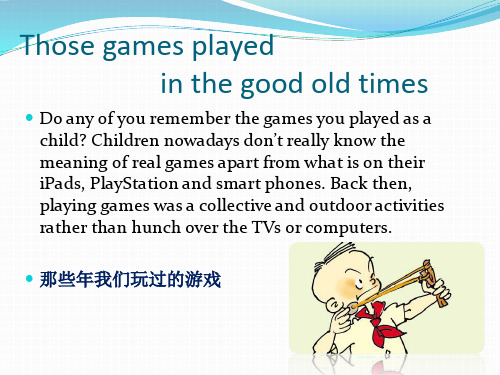
Hop-A-Little game
Create a circle while hopping on one foot.
Blind game
There are several versions of it. The blindfolded
children should walk around the circle formed by their classmates and identify the one they touch. In other versions, the blindfolded children draw something, like a nose on the figure already on the board to complete it according to instructions given by their classmates.
Rope skipping
This may consist of one participant turning and
jumping the rope, or a minimum of three participants taking turns, two of whom turn the rope while one or more jumps.
Hopscotch
Hopscotch is a popular playground game in which
players toss a small object into numbered spaces of a pattern of rectangles outlined on the ground and then hop or jump through the spaces to retrieve the object.
过去小朋友玩的游戏英语作文

The Enchanting World of Childhood Games:A Nostalgic JourneyIn the bygone era, before the advent of high-tech gadgets and digital games, children's playtimes were filled with simple yet imaginative games that fostered creativity and camaraderie. These games, often played outdoors, were not only sources of entertainment but also valuable lessons in life. They taught us about teamwork, problem-solving,and the joy of innocent competition. This essay aims to delve into the nostalgic world of pastimes that oncedefined our childhood."Hide and Seek," a classic game that required nothing more than a group of eager children and an open space, wasa staple in every playground. It was a game of anticipation, stealth, and quick thinking. The thrill of hiding, the suspense of waiting, and the exhilaration of being the seeker were experiences that left an indelible mark on our young minds. It taught us the importance of patience andthe thrill of the chase, values that still resonate in our adult lives.Another timeless game was "跳房子" (Hopscotch), knownas 'Hopscotch' in English. Drawn on the ground with chalk, this game involved hopping from one square to another,often tossing a small stone or pebble into each square. It was a game that tested balance, agility, and strategic planning. Moreover, it was a social activity that brought children together, fostering friendships and promoting physical fitness."Tag," or "你追我赶" in Chinese, was another favorite pastime. It was a simple game of chase where the 'it' would try to touch someone, making them the new 'it.' It was a game of speed, agility, and quick reflexes. More importantly, it instilled a sense of fair play and sportsmanship, as we learned to accept defeat gracefullyand to respect the rules."Red Light, Green Light" or "红绿灯" in Chinese, was a game that taught us self-control and observation. Theplayer who acted as the traffic light would call out commands, and everyone else had to stop or move accordingly. This game not only entertained but also taught us about obedience and the importance of following instructions.Not all games were physically demanding. "Chinese Whispers" or "传话游戏" was a game of whispers and misinterpretations. Sitting in a line, children would whisper a phrase to the next person, who would then pass it on, and so on. The last person would announce the phrase, often revealing hilarious distortions. This game taught us the value of clear communication and the dangers of misinformation.Lastly, "Paper, Scissors, Rock" or "石头、剪刀、布" was a simple decision-making game. With three possible choices, each having its own strengths and weaknesses, it taught us about strategy and the concept of chance. It was a gamethat could resolve any dispute with laughter and good humor. These games, though seemingly trivial, played a significant role in shaping our childhood. They were more than just entertainment; they were learning grounds for social skills, problem-solving, and physical dexterity.They taught us about teamwork, fairness, and resilience, values that have stayed with us throughout our lives. As we look back at those days, we realize that the simplicity ofthose games held within them the richness of life's most important lessons.In today's world, where technology has taken over, itis crucial to remember the value of these traditional games. They not only offer a break from the digital realm but also provide a platform for children to learn, interact, and grow. So, let us encourage our children to step outside,pick up a stone, draw a hopscotch grid, or simply play a game of hide and seek. For in these simple games lies the magic of an unforgettable childhood.。
爸爸的童年游戏滚铁环英语作文300字左右

爸爸的童年游戏滚铁环英语作文300字左右全文共3篇示例,供读者参考篇1My Father's Childhood Game of Rolling Metal RingsGrowing up, my father often reminisced about his childhood and the simple pleasures he found in the most ordinary of things. One particular game he spoke of with great fondness was the game of rolling metal rings, a pasttime that provided him with endless hours of entertainment during his younger years.In those days, before the advent of sophisticated electronic gadgets and video games, children had to rely on their creativity and resourcefulness to devise their own amusements. For my father and his friends, this took the form of a game involving metal rings, likely discarded from some industrial process or machinery.The rules were simple: gather a collection of these metal rings, varying in size and weight, and take turns rolling them across the dirt roads or open fields near their homes. The objective was to roll the ring as far as possible, with the winner being the one whose ring traveled the greatest distance.What made this game so captivating, according to my father, was not only the competitive spirit it fostered but also the skill and technique required to execute the perfect roll. They would spend hours studying the terrain, looking for the smoothest patches of ground and adjusting their grip and stance to maximize the ring's momentum.Beyond the physical aspect of the game, my father spoke of the camaraderie and social bonds it fostered among his group of friends. As they gathered to play, they would exchange stories, jokes, and the latest neighborhood gossip, creating a sense of community and belonging that transcended the mere act of rolling metal rings.In retrospect, my father's fondness for this childhood game stemmed not only from the enjoyment it provided but also from the simplicity and innocence of those bygone days. It was a time when the most basic of objects could ignite the imagination and bring pure, unadulterated joy to a young heart.As I listened to these stories, I couldn't help but feel a twinge of envy for the carefree existence my father experienced as a child. In our modern world, where entertainment is packaged and delivered instantaneously, there is something profoundlybeautiful and nostalgic about the idea of finding such unbridled happiness in something as simple as rolling metal rings.篇2My Father's Childhood Game of Rolling Iron RingsWhen I was younger, I loved hearing stories from my dad about his childhood. One tale that always fascinated me was his description of a game he and his friends used to play called "Rolling Iron Rings." It was a simple yet challenging game that kept them entertained for hours on end.In those days, before the advent of modern technology and video games, children had to be more creative and resourceful when it came to finding ways to have fun. My dad's neighborhood was a humble one, with limited means, but that didn't stop him and his friends from turning everyday objects into sources of amusement.The game of Rolling Iron Rings involved taking old, discarded metal rings – sometimes from bicycle tires or machinery parts – and attempting to roll them as far as possible down the street using nothing but a straightened coat hanger. The rules were simple: each player took turns rolling their ring,and the one whose ring traveled the farthest distance was declared the winner of that round.According to my dad, mastering the art of rolling these iron rings was no easy feat. It required a delicate touch and precise control over the coat hanger's angle and force. Too much power, and the ring would veer off course or even bounce off the ground. Too little, and it wouldn't gain enough momentum to roll far.But the true appeal of the game, my dad would explain, wasn't just the challenge itself but the sense of camaraderie and friendly competition it fostered among the neighborhood kids. They would spend hours on the street, taking turns rolling their rings, cheering each other on, and reveling in the simple joys of childhood.As I listened to these stories, I couldn't help but feel a sense of nostalgia for a simpler time when entertainment wasn't dictated by screens and technology but rather by creativity, resourcefulness, and the ability to find joy in the most unexpected of places. It was a reminder that true happiness often lies in the simplest of things, and that the bonds of friendship forged through shared experiences can be just as precious as any material possession.篇3My Dad's Childhood Game of Rolling HoopsWhen I asked my dad what games he played as a kid growing up in a small village, he got a nostalgic look in his eyes and told me all about his favorite pastime - rolling hoops. It was such a simple game, but one that provided him with countless hours of fun and excitement.Back in those days, they didn't have fancy toys or video games. The kids had to make their own entertainment, using whatever resources were available to them. For my dad and his friends, that meant fashioning hoops out of strips of wood or metal scraps they could scavenge.The idea was to roll these hoops along the ground, chasing after them with a long stick, trying to keep them upright and going as far as possible before they inevitably clanged to the dirt road. My dad said it took skill and coordination to roll the hoop perfectly straight. Any little wobble and it would veer off course or topple over.They'd have contests to see who could roll their hoop the farthest distance without it falling. The village streets became their playing field, dodging vehicles (which were few back then),wandering chickens, and anything else that might disrupt their hoops' journey.Sometimes they'd decorate the hoops, painting them bright colors or adding bells that jingled as they rolled. It was a way to show creativity and individuality with their simple toys. More than just a game, it was an opportunity to socialize, build bonds, and create cherished memories.As I listened to my dad recount those bygone days, I could almost picture him as a carefree young boy, whiling away the hours rolling hoops with his pals, completely absorbed in their humble but wondrous game. It made me appreciate how kids can transform the most basic object into an imaginative adventure when motivated by youthful enthusiasm.While rolling hoops may seem terribly antiquated in our era of powerful gaming consoles, my dad's tales fill me with nostalgia for the simple joys and pleasures of childhood pastimes. Perhaps there's something we can learn from the ingenuity and creative spirit that defined playtime during those simpler times.。
8090后的童年游戏弹弹珠作文
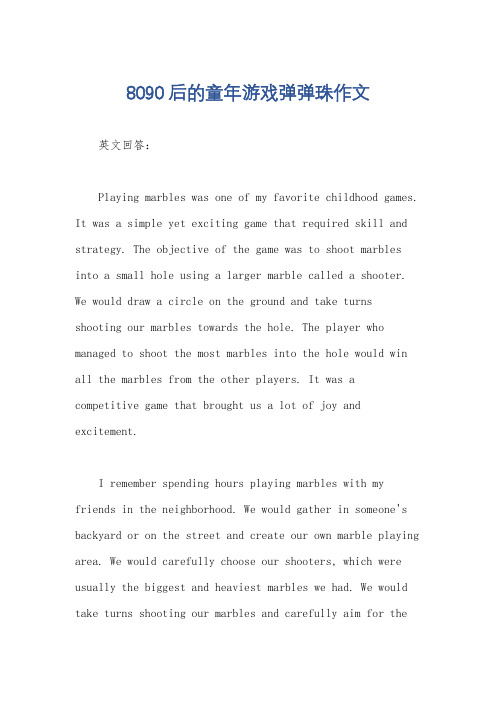
8090后的童年游戏弹弹珠作文英文回答:Playing marbles was one of my favorite childhood games. It was a simple yet exciting game that required skill and strategy. The objective of the game was to shoot marbles into a small hole using a larger marble called a shooter. We would draw a circle on the ground and take turns shooting our marbles towards the hole. The player who managed to shoot the most marbles into the hole would win all the marbles from the other players. It was a competitive game that brought us a lot of joy and excitement.I remember spending hours playing marbles with my friends in the neighborhood. We would gather in someone's backyard or on the street and create our own marble playing area. We would carefully choose our shooters, which were usually the biggest and heaviest marbles we had. We would take turns shooting our marbles and carefully aim for thehole. Sometimes we would use our fingers to flick the shooter, while other times we would use a small stick to give it more power and accuracy. It was always a challenge to shoot the marbles into the hole, but when we succeeded, it felt incredibly satisfying.Playing marbles was not just about shooting marblesinto a hole, it was also about trading and collecting marbles. We would bring our own marbles to the game and sometimes even bet them against each other. If we won a game, we would get to keep the marbles we won from the other players. This added an extra level of excitement and competitiveness to the game. We would often trade marbles with each other, trying to get the rarest and most valuable ones. It was like a mini marketplace where we would negotiate and barter for the marbles we desired.中文回答:弹弹珠是我童年时最喜欢的游戏之一。
- 1、下载文档前请自行甄别文档内容的完整性,平台不提供额外的编辑、内容补充、找答案等附加服务。
- 2、"仅部分预览"的文档,不可在线预览部分如存在完整性等问题,可反馈申请退款(可完整预览的文档不适用该条件!)。
- 3、如文档侵犯您的权益,请联系客服反馈,我们会尽快为您处理(人工客服工作时间:9:00-18:30)。
Games of Childhood
slingshot 弹弓
弹珠 marbles
marble:大理石;大理石制品; 弹珠
抽陀螺 spinning top
捉迷藏 hide-and-seek
翻绳 Cat's Cradle
跳房子 hopscotch ['hɒpskɒtʃ]
丢沙包 beanbag game
Have you seen my childhood? I'm searching for the world that I come from 'Cause I've been looking around In the lost and found of my heart... No one understands me... They view it as such strange eccentricities... 'Cause I keep kidding around Like a child ,but pardon me..
பைடு நூலகம்
*People say I'm not okay 'Cause I love such elementary things... It's been my fate to compensate ,for the childhood.... I never know ... Have you seen my childhood? I'm searching for that wonder in my youth. Like pirates and adventurous dreams. Of conquest and kings on the throne.. Before you judge me,try hard to love me Look within your heart then ask Have you seen my childhood? *The painful youth I've had Have you seen my childhood?
跳皮筋 rubber band skipping
跳绳 skip the rope
123木头人 statues
吹泡泡 blow bubbles
踢毽子 kick shuttlecock ['ʃʌt(ə)lkɒk]
注意:shuttlecock也指羽毛球
石头剪刀布 scissors-paper-stone ['sɪzəz]
吹泡泡 blow bubbles 跳绳 skip the rope 踢毽子 kick shuttlecock 石头剪子布 scissors-paper-stone 扇洋片 fan the paper cards
扇洋片 fan the paper cards
过家家 play house
呼啦圈 hula hoop
hula:草裙舞(夏威夷的);呼拉圈 舞(夏威夷的) hoop:箍;铁环;呼呼声
荡秋千 Swing
挑木棍
Sum up
弹弓 slingshot 弹珠 marbles 跳房子 hopscotch ['hɒpskɒtʃ] 丢沙包 beanbag game 跳皮筋 rubber band skipping 123木头人 statues 翻花绳 cat's cradle 抽陀螺 spinning top 捉迷藏 hide-and-seek 过家家 play house 呼啦圈 hula hoop 荡秋千swing
